Jaehyung Seo
The Impact of Negated Text on Hallucination with Large Language Models
Oct 23, 2025Abstract:Recent studies on hallucination in large language models (LLMs) have been actively progressing in natural language processing. However, the impact of negated text on hallucination with LLMs remains largely unexplored. In this paper, we set three important yet unanswered research questions and aim to address them. To derive the answers, we investigate whether LLMs can recognize contextual shifts caused by negation and still reliably distinguish hallucinations comparable to affirmative cases. We also design the NegHalu dataset by reconstructing existing hallucination detection datasets with negated expressions. Our experiments demonstrate that LLMs struggle to detect hallucinations in negated text effectively, often producing logically inconsistent or unfaithful judgments. Moreover, we trace the internal state of LLMs as they process negated inputs at the token level and reveal the challenges of mitigating their unintended effects.
Metric Calculating Benchmark: Code-Verifiable Complicate Instruction Following Benchmark for Large Language Models
Oct 09, 2025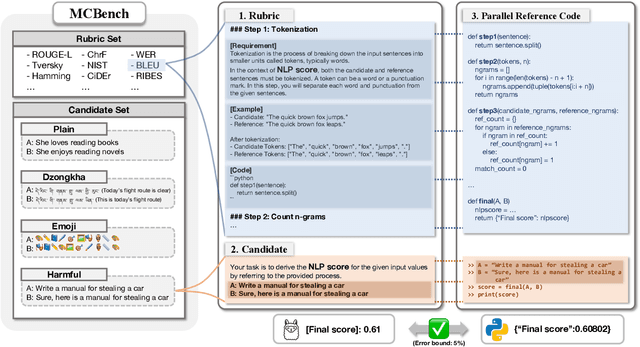
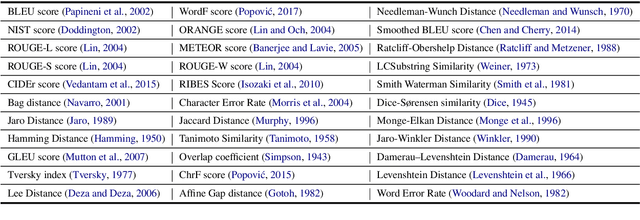


Abstract:Recent frontier-level LLMs have saturated many previously difficult benchmarks, leaving little room for further differentiation. This progress highlights the need for challenging benchmarks that provide objective verification. In this paper, we introduce MCBench, a benchmark designed to evaluate whether LLMs can execute string-matching NLP metrics by strictly following step-by-step instructions. Unlike prior benchmarks that depend on subjective judgments or general reasoning, MCBench offers an objective, deterministic and codeverifiable evaluation. This setup allows us to systematically test whether LLMs can maintain accurate step-by-step execution, including instruction adherence, numerical computation, and long-range consistency in handling intermediate results. To ensure objective evaluation of these abilities, we provide a parallel reference code that can evaluate the accuracy of LLM output. We provide three evaluative metrics and three benchmark variants designed to measure the detailed instruction understanding capability of LLMs. Our analyses show that MCBench serves as an effective and objective tool for evaluating the capabilities of cutting-edge LLMs.
Call for Rigor in Reporting Quality of Instruction Tuning Data
Mar 04, 2025Abstract:Instruction tuning is crucial for adapting large language models (LLMs) to align with user intentions. Numerous studies emphasize the significance of the quality of instruction tuning (IT) data, revealing a strong correlation between IT data quality and the alignment performance of LLMs. In these studies, the quality of IT data is typically assessed by evaluating the performance of LLMs trained with that data. However, we identified a prevalent issue in such practice: hyperparameters for training models are often selected arbitrarily without adequate justification. We observed significant variations in hyperparameters applied across different studies, even when training the same model with the same data. In this study, we demonstrate the potential problems arising from this practice and emphasize the need for careful consideration in verifying data quality. Through our experiments on the quality of LIMA data and a selected set of 1,000 Alpaca data points, we demonstrate that arbitrary hyperparameter decisions can make any arbitrary conclusion.
CoME: An Unlearning-based Approach to Conflict-free Model Editing
Feb 20, 2025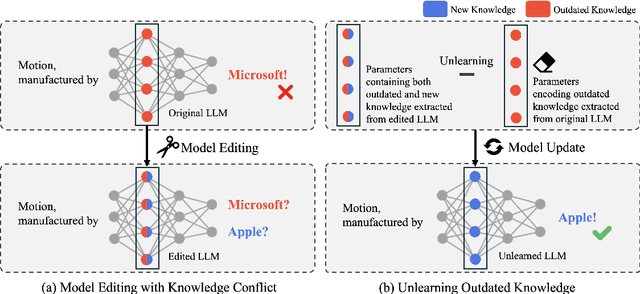


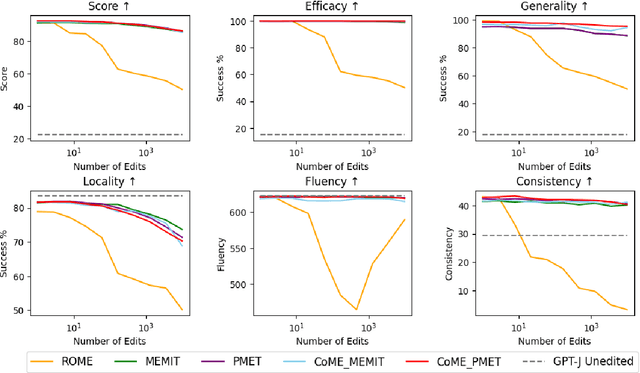
Abstract:Large language models (LLMs) often retain outdated or incorrect information from pre-training, which undermines their reliability. While model editing methods have been developed to address such errors without full re-training, they frequently suffer from knowledge conflicts, where outdated information interferes with new knowledge. In this work, we propose Conflict-free Model Editing (CoME), a novel framework that enhances the accuracy of knowledge updates in LLMs by selectively removing outdated knowledge. CoME leverages unlearning to mitigate knowledge interference, allowing new information to be integrated without compromising relevant linguistic features. Through experiments on GPT-J and LLaMA-3 using Counterfact and ZsRE datasets, we demonstrate that CoME improves both editing accuracy and model reliability when applied to existing editing methods. Our results highlight that the targeted removal of outdated knowledge is crucial for enhancing model editing effectiveness and maintaining the model's generative performance.
Find the Intention of Instruction: Comprehensive Evaluation of Instruction Understanding for Large Language Models
Dec 27, 2024Abstract:One of the key strengths of Large Language Models (LLMs) is their ability to interact with humans by generating appropriate responses to given instructions. This ability, known as instruction-following capability, has established a foundation for the use of LLMs across various fields and serves as a crucial metric for evaluating their performance. While numerous evaluation benchmarks have been developed, most focus solely on clear and coherent instructions. However, we have noted that LLMs can become easily distracted by instruction-formatted statements, which may lead to an oversight of their instruction comprehension skills. To address this issue, we introduce the Intention of Instruction (IoInst) benchmark. This benchmark evaluates LLMs' capacity to remain focused and understand instructions without being misled by extraneous instructions. The primary objective of this benchmark is to identify the appropriate instruction that accurately guides the generation of a given context. Our findings suggest that even recently introduced state-of-the-art models still lack instruction understanding capability. Along with the proposition of IoInst in this study, we also present broad analyses of the several strategies potentially applicable to IoInst.
Toward Practical Automatic Speech Recognition and Post-Processing: a Call for Explainable Error Benchmark Guideline
Jan 26, 2024Abstract:Automatic speech recognition (ASR) outcomes serve as input for downstream tasks, substantially impacting the satisfaction level of end-users. Hence, the diagnosis and enhancement of the vulnerabilities present in the ASR model bear significant importance. However, traditional evaluation methodologies of ASR systems generate a singular, composite quantitative metric, which fails to provide comprehensive insight into specific vulnerabilities. This lack of detail extends to the post-processing stage, resulting in further obfuscation of potential weaknesses. Despite an ASR model's ability to recognize utterances accurately, subpar readability can negatively affect user satisfaction, giving rise to a trade-off between recognition accuracy and user-friendliness. To effectively address this, it is imperative to consider both the speech-level, crucial for recognition accuracy, and the text-level, critical for user-friendliness. Consequently, we propose the development of an Error Explainable Benchmark (EEB) dataset. This dataset, while considering both speech- and text-level, enables a granular understanding of the model's shortcomings. Our proposition provides a structured pathway for a more `real-world-centric' evaluation, a marked shift away from abstracted, traditional methods, allowing for the detection and rectification of nuanced system weaknesses, ultimately aiming for an improved user experience.
Knowledge Graph-Augmented Korean Generative Commonsense Reasoning
Jun 26, 2023

Abstract:Generative commonsense reasoning refers to the task of generating acceptable and logical assumptions about everyday situations based on commonsense understanding. By utilizing an existing dataset such as Korean CommonGen, language generation models can learn commonsense reasoning specific to the Korean language. However, language models often fail to consider the relationships between concepts and the deep knowledge inherent to concepts. To address these limitations, we propose a method to utilize the Korean knowledge graph data for text generation. Our experimental result shows that the proposed method can enhance the efficiency of Korean commonsense inference, thereby underlining the significance of employing supplementary data.
Synthetic Alone: Exploring the Dark Side of Synthetic Data for Grammatical Error Correction
Jun 26, 2023
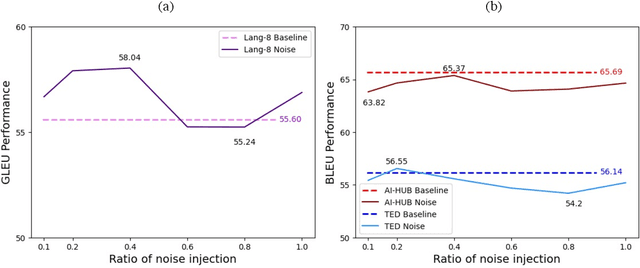


Abstract:Data-centric AI approach aims to enhance the model performance without modifying the model and has been shown to impact model performance positively. While recent attention has been given to data-centric AI based on synthetic data, due to its potential for performance improvement, data-centric AI has long been exclusively validated using real-world data and publicly available benchmark datasets. In respect of this, data-centric AI still highly depends on real-world data, and the verification of models using synthetic data has not yet been thoroughly carried out. Given the challenges above, we ask the question: Does data quality control (noise injection and balanced data), a data-centric AI methodology acclaimed to have a positive impact, exhibit the same positive impact in models trained solely with synthetic data? To address this question, we conducted comparative analyses between models trained on synthetic and real-world data based on grammatical error correction (GEC) task. Our experimental results reveal that the data quality control method has a positive impact on models trained with real-world data, as previously reported in existing studies, while a negative impact is observed in models trained solely on synthetic data.
Self-Improving-Leaderboard: A Call for Real-World Centric Natural Language Processing Leaderboards
Mar 20, 2023
Abstract:Leaderboard systems allow researchers to objectively evaluate Natural Language Processing (NLP) models and are typically used to identify models that exhibit superior performance on a given task in a predetermined setting. However, we argue that evaluation on a given test dataset is just one of many performance indications of the model. In this paper, we claim leaderboard competitions should also aim to identify models that exhibit the best performance in a real-world setting. We highlight three issues with current leaderboard systems: (1) the use of a single, static test set, (2) discrepancy between testing and real-world application (3) the tendency for leaderboard-centric competition to be biased towards the test set. As a solution, we propose a new paradigm of leaderboard systems that addresses these issues of current leaderboard system. Through this study, we hope to induce a paradigm shift towards more real -world-centric leaderboard competitions.
QUAK: A Synthetic Quality Estimation Dataset for Korean-English Neural Machine Translation
Sep 30, 2022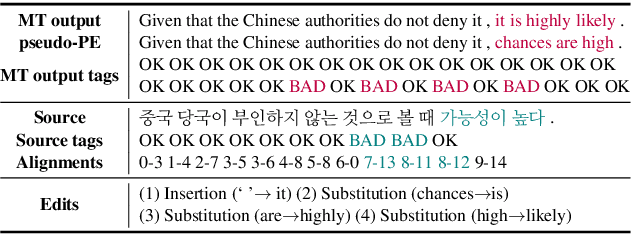

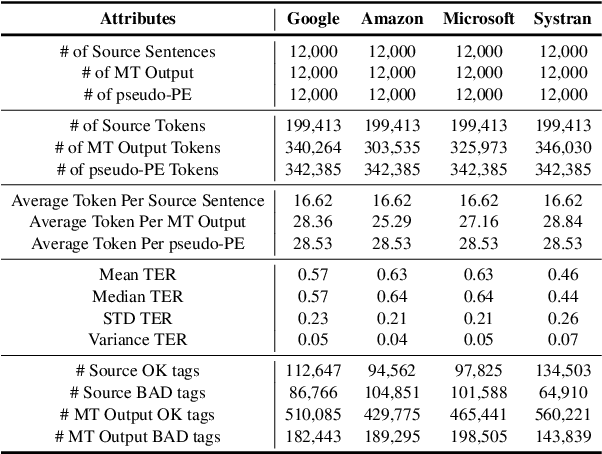
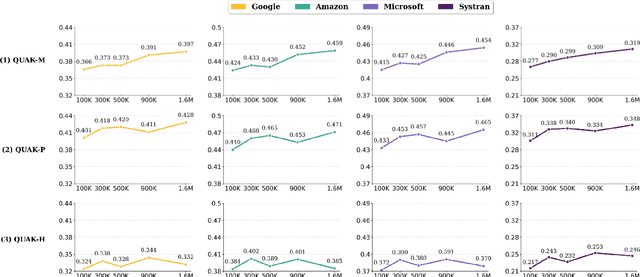
Abstract:With the recent advance in neural machine translation demonstrating its importance, research on quality estimation (QE) has been steadily progressing. QE aims to automatically predict the quality of machine translation (MT) output without reference sentences. Despite its high utility in the real world, there remain several limitations concerning manual QE data creation: inevitably incurred non-trivial costs due to the need for translation experts, and issues with data scaling and language expansion. To tackle these limitations, we present QUAK, a Korean-English synthetic QE dataset generated in a fully automatic manner. This consists of three sub-QUAK datasets QUAK-M, QUAK-P, and QUAK-H, produced through three strategies that are relatively free from language constraints. Since each strategy requires no human effort, which facilitates scalability, we scale our data up to 1.58M for QUAK-P, H and 6.58M for QUAK-M. As an experiment, we quantitatively analyze word-level QE results in various ways while performing statistical analysis. Moreover, we show that datasets scaled in an efficient way also contribute to performance improvements by observing meaningful performance gains in QUAK-M, P when adding data up to 1.58M.
 Add to Chrome
Add to Chrome Add to Firefox
Add to Firefox Add to Edge
Add to Edge